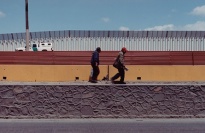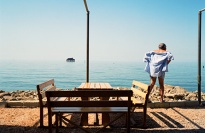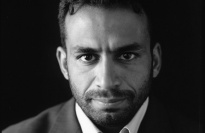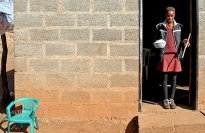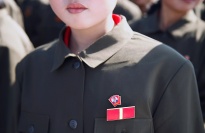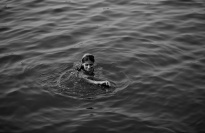About Moving Walls 15
Moving Walls 15 aims to visually represent the transitional condition of open societies and the promotion and maintenance of democratic values. It is an artistic interpretation of obstacles—such as political oppression, economic instability, and racism—and the struggles to tear those barriers down. Moving Walls 15 includes six photographers covering a range of social justice and human rights issues of significance to the Open Society Foundations.
Chris Bartlett creates portraits of Iraqis who were detained by the United States military and its surrogates and, according to their first-person accounts, subjected to torture and abuse and then released without charges. By juxtaposing descriptions of treatment at Abu Ghraib with straightforward portraits and biographical information, Bartlett reminds us that behind the dehumanizing and anonymous images of torture—such as the infamous photograph of “the man on the box”—are dignified individuals who are not merely victims.
Abuse of power is conveyed quite differently in Philippe Chancel’s photographs of North Korea, perhaps the most closed society in the world. Chancel offers a window into that country and shows how the leadership’s pervasive misuse of power and depth of narcissism manifests itself in the everyday life of North Koreans. His images, while beautiful and striking, paint a haunting picture of absolute control.
Lesley Louden focuses her camera on Lesotho, a country that has been devastated by the HIV/AIDS epidemic. She profiles the work of the African Library Project, which uses literacy and the teaching of English as a way of providing orphaned children with hope and lessons in HIV prevention.
Shehzad Noorani’s photographs of the extreme pollution of the Buriganga River in Dhaka, Bangladesh, depict the suffering of those who make their homes and living on the river. The consequences of environmental problems such as pollution and global warming are spreading in countries marked by prosperity as well as places mired in poverty.
The last 16 years since Soviet rule ended in Azerbaijan have been characterized by rapid economic growth and, on the surface, prosperity. With this prosperity comes an ever widening gap between the haves and have-nots, including an increase in slums, pollution, corruption, and displacement. James Pomerantz’s images reflect this disconnect in society between a vanishing present and an uncertain future.
Drawing from his experience growing up in Germany and photographing the fall of the Berlin Wall, Kai Wiedenhöfer aims his lens at another border, the one separating Mexico from the United States. His images pay witness to a failed U.S. immigration policy which fences and walls cannot fix.
The Open Society’s Culture and Art program looks at the nexus between photography and advocacy. Through the Moving Walls exhibit, workshops, grantmaking, and public programs, the project explores how photography can shape public perception and effect social change.
